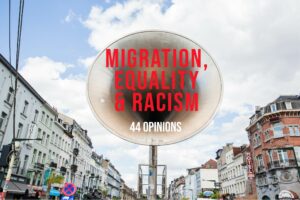 More than 80 VUB academics and co-authors have joined forces for this book and take a stance on migration, equality and racism in 44 thought-provoking and informed opinion pieces.
More than 80 VUB academics and co-authors have joined forces for this book and take a stance on migration, equality and racism in 44 thought-provoking and informed opinion pieces.
You can watch the entire book launch event of 21 January 2021 here.
The book is available: download the pdf for free: in English or in Dutch, order the e-book version at BIRMM, or buy the printed version of the book from ASP Editions.
Contributions by members of the research group TOR:
Opacity of the education system creates disadvantages for pupils with migration background
Laura Emery, Ilse Laurijssen, Simon Boone &
The educational system of Flanders is complex, and characterised by hidden tracking. Although the hierarchy between tracks is actively denied in official educational discourse, it is inherent in how the educational system is organised. Pupils and parents act upon it when making their study choice, and those with strategic knowledge of the system have a head start as they have the network and necessary handles to position themselves strongly in the hierarchy of study options. Pupils with a migration background on the other hand are having a hard time finding their way in the educational system. This is partly caused by hampered access to strategic information, as the informal rules of the education game are often not shared with people with a migration background.
Tolerance towards LGBTQI+ can be developed from within religions
Filip Van Droogenbroeck, Bram Spruyt & Jessy Siongers
Religion seems to be at odds with a tolerant attitude towards LGBTQ: Christians and Muslims are more likely to have prejudices and negative views on homosexuality. That in itself is not surprising. Although all major religious traditions convey a message of universal compassion and tolerance, conservative interpretations of Abrahamic religions (including Christianity and Islam) also represent a heteronormative framework that explicitly forbids homosexuality. Since in Western societies Christian beliefs still have a significant influence on political values and cultural conservatism, and there is an increasing number of (young) Muslims among the population, the key question remains how we can cultivate a tolerant and respectful attitude towards LGBTQ. Is religion irreconcilable with tolerance towards LGBTQ? Do religious people in Europe have to drop their religious convictions to become more tolerant of LGBTQ?
Unity in diversity: the Brussels identity glues everyone together
Petrus te Braak, , Hélène Lemblé & Gil Keppens
Nowadays, identity is considered to be multilayered. Recent data show that a Brussels identity is the first layer of identity formation for young Brusselians, followed, in second place, by an identification with Belgium and/or the country of origin. Only few people identify with Wallonia and Flanders. We argue that this is related to the demographic composition of Brussels: no ethnic group is dominant, which means that Brusselians belong neither to a minority nor a majority. The Brussels identity, unlike the Belgian, Walloon and Flemish identity, is an open identity that can be interpreted differently by everyone.